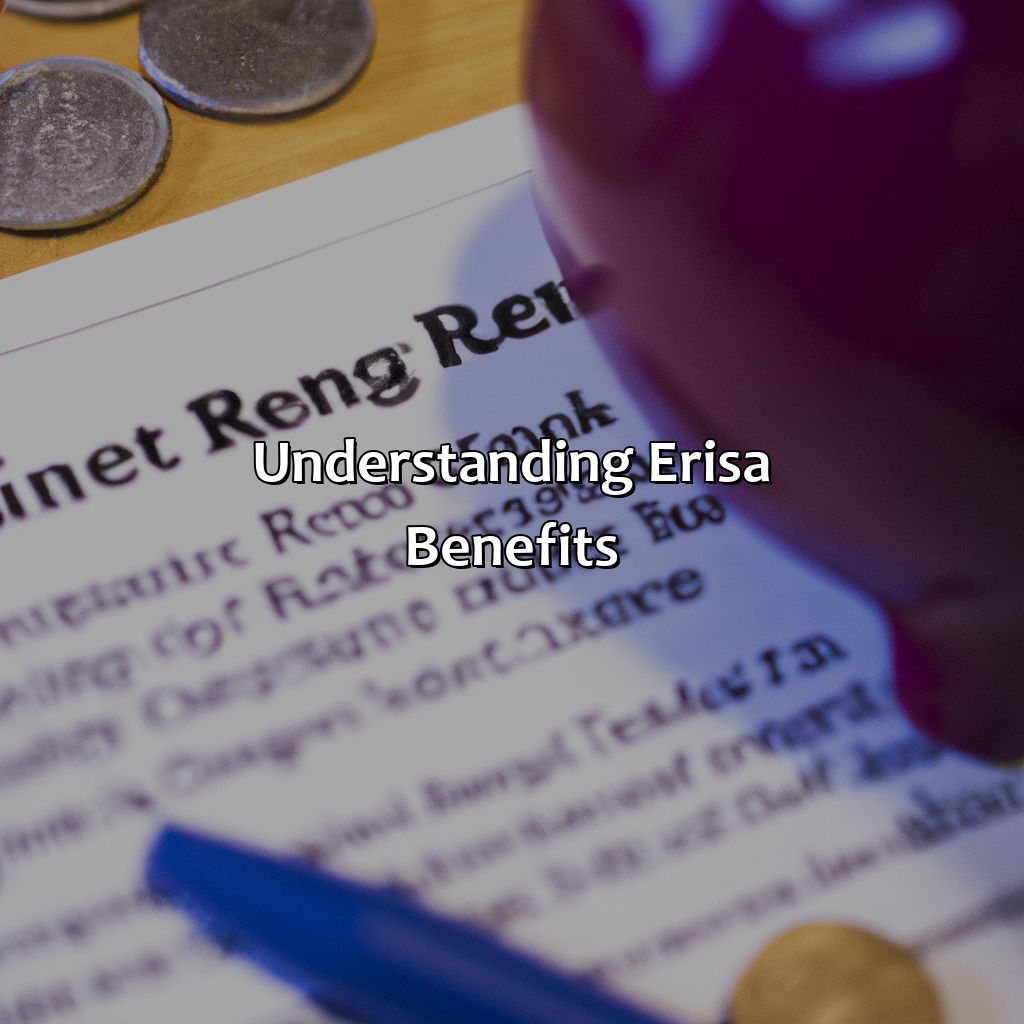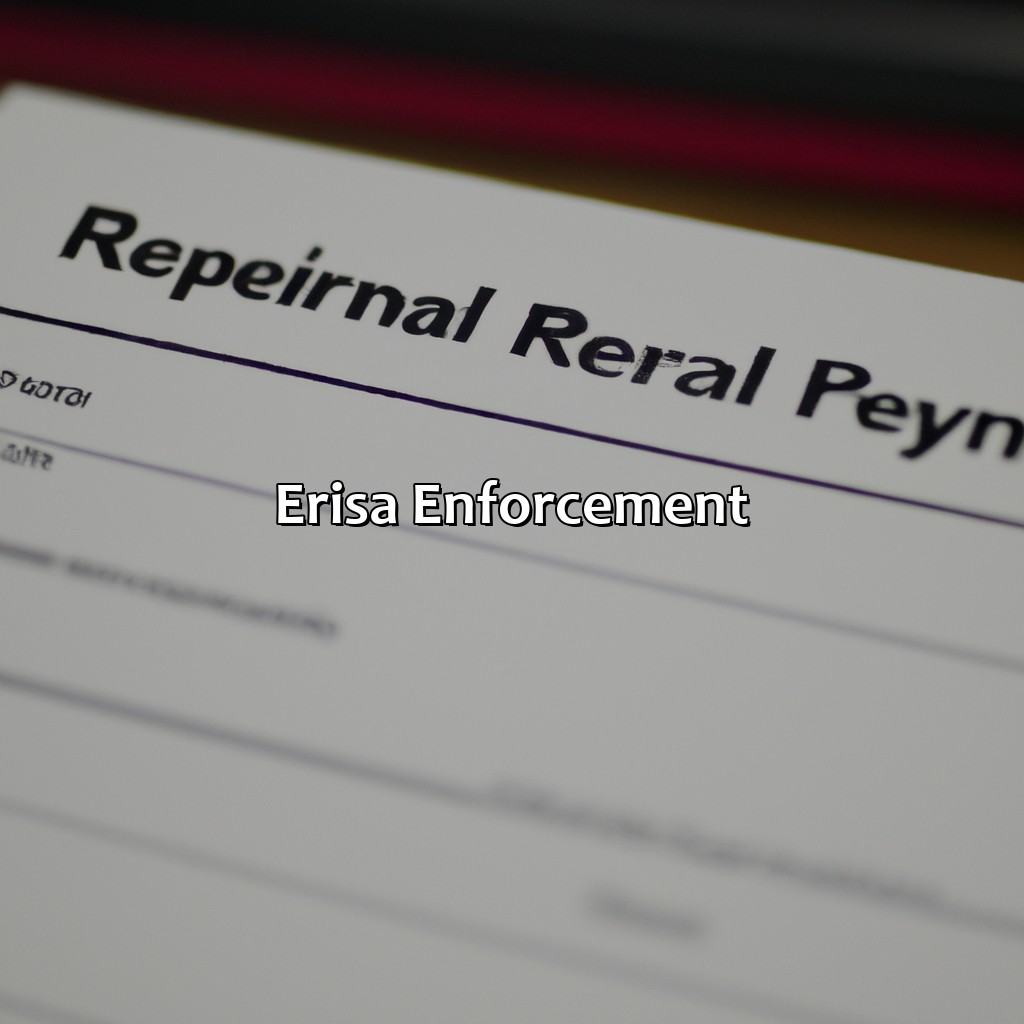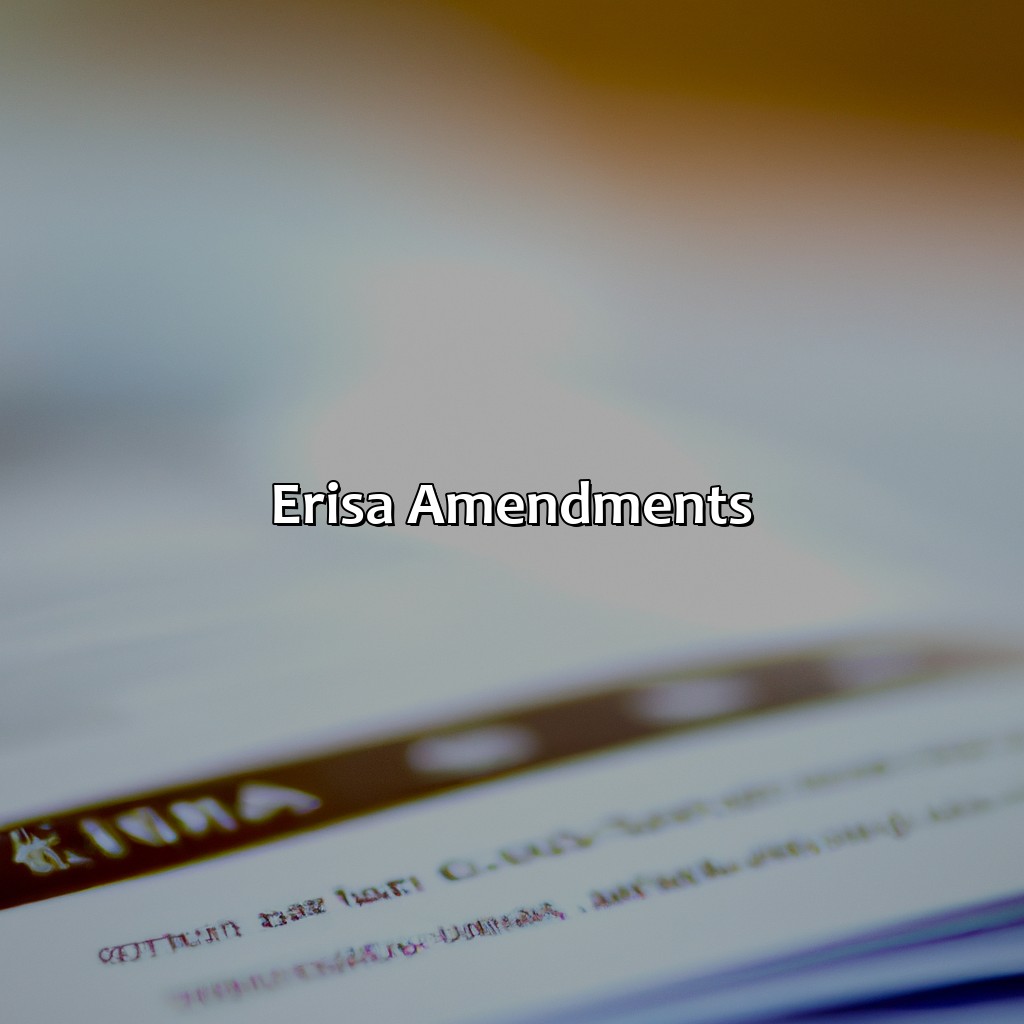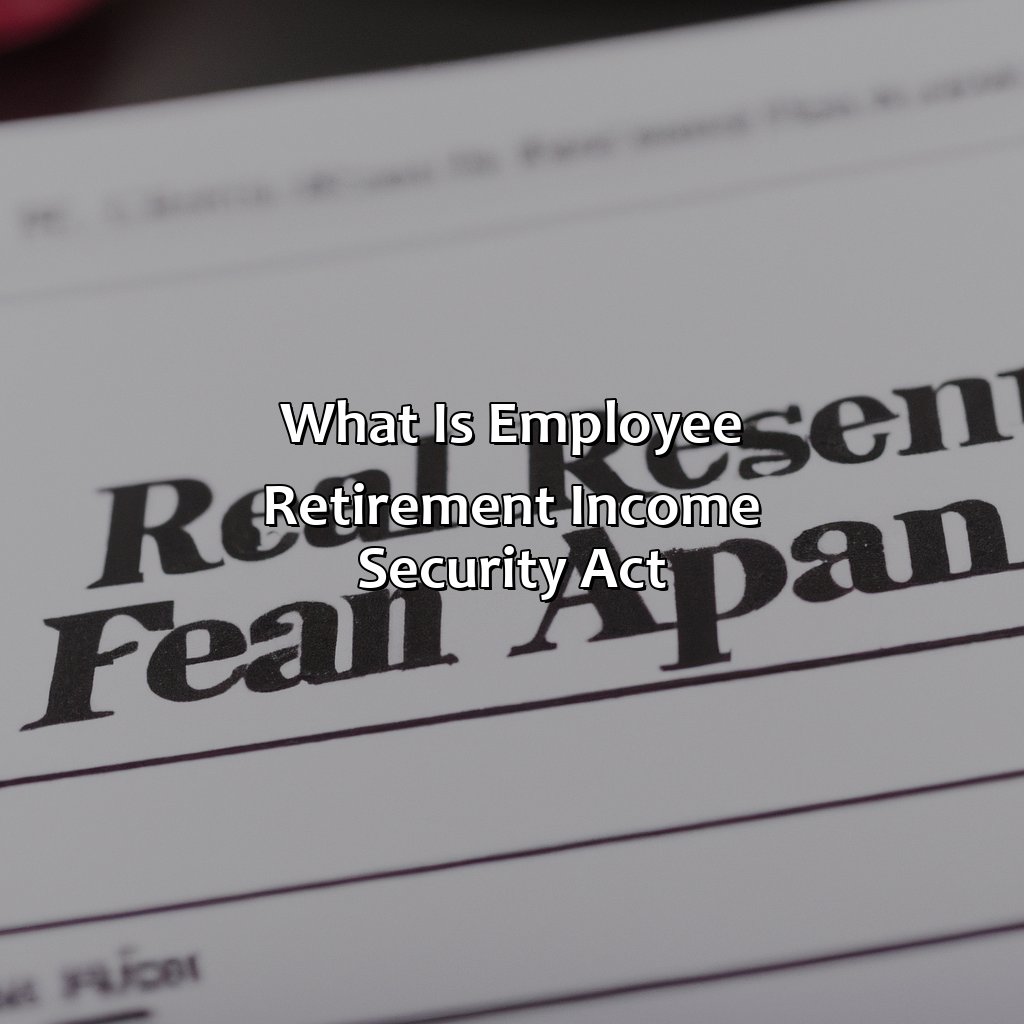What Is Employee Retirement Income Security Act?
Key Takeaway:
\n
- ERISA is a federal law that sets standards for retirement and health plans in the private industry to protect the interests of employees.
- ERISA requires employers to provide information about their benefits plans, the fiduciary responsibilities, and how to file a claim or appeal.
- The consequences of non-compliance with ERISA can result in severe penalties, lawsuits, and even criminal charges.
\n
\n
Are you confused about the legalities related to employee retirement income? The Employee Retirement Income Security Act (ERISA) is here to help! Gain a better understanding of this legislation and its purpose in protecting your financial future.
Employee Retirement Income Security Act (ERISA) in a Nutshell
The Employee Retirement Income Security Act (ERISA) is a federal law that sets minimum standards for most voluntarily established retirement and health plans in private industry. ERISA primarily regulates employer-sponsored retirement plans, protecting employees’ rights to receive promised benefits and holding employers accountable for managing and disclosing plan information. ERISA also provides guidelines for fiduciaries responsible for investment decisions to ensure they act in the best interests of plan participants. Overall, ERISA aims to safeguard the financial security of American workers and their families.
It’s crucial for employers to comply with ERISA regulations to avoid penalties and legal liabilities. To ensure a successful retirement plan, employers must thoroughly understand the plan’s rules and regulations, carefully manage plan assets, and provide participants with necessary disclosures and information. Noncompliance with ERISA regulations can result in severe penalties and fines.
In today’s business world, a robust retirement plan is more crucial than ever. Employers who provide a well-structured retirement plan not only attract and retain talented employees but also help ensure their long-term financial stability. Thus, complying with ERISA regulations is crucial to avoid legal and financial consequences while facilitating a better future for employees.

Image credits: retiregenz.com by Adam Washington
ERISA Basics
ERISA, or the Employee Retirement Income Security Act, is a federal law that governs most employer-sponsored group benefits, such as health, retirement, and disability plans. ERISA sets minimum standards for these plans, ensuring that employees receive important information about their benefits, including how the plans are funded, what benefits are available, and how to file claims. Employers that offer benefits subject to ERISA must also follow rules regarding disclosure and reporting to the government. It is important for employees to understand their rights and protections under ERISA, as well as the role of their employer and plan administrators in managing their benefits.
Pro Tip: Employers should ensure that their benefits plans comply with ERISA regulations to avoid legal liabilities and penalties. Consider consulting an experienced ERISA attorney to help navigate the complex requirements.

Image credits: retiregenz.com by James Woodhock
Understanding ERISA Benefits
ERISA is a federal law that sets minimum standards for retirement and health benefit plans in the private sector. Eligible employees can participate in the plan, and employers have a fiduciary responsibility to manage the plan in the best interest of the participants. The law also requires plan administrators to provide specific information to participants, including plan features, funding, and benefits. It’s essential to understand ERISA benefits to make informed decisions and protect oneself from potential risks. Remember, always check the plan’s summary plan description before taking action.
ERISA has specific rules that protect employees from plan mismanagement and ensure the timely payment of benefits. It also guarantees certain rights, such as the ability to sue for benefits and the opportunity to appeal a denied claim. Additionally, ERISA benefits protect plan participants from fraud and misrepresentation. Remember, it’s crucial to understand your rights under ERISA to ensure the plan administrator is fulfilling their responsibilities.
Pro Tip: It’s critical to read and understand your plan’s summary plan description, as it contains essential information about the plan, including benefits, costs, and restrictions. If you’re unsure, reach out to the plan administrator for additional clarification.

Image credits: retiregenz.com by Yuval Jones
ERISA Enforcement
ERISA, the Employee Retirement Income Security Act, is the federal law that regulates employer-sponsored retirement plans. ERISA enforcement is the process through which the government ensures compliance with these laws. This includes analyzing plan disclosures, monitoring financial reporting, and addressing any alleged violations of plan participants’ rights.
The Department of Labor is responsible for supervising ERISA enforcement and ensuring plans are run in the interest of their participants. To achieve this, the DOL has the power to investigate, hold hearings, and impose penalties against plans that fall short of ERISA’s requirements. Plans can also be sued by participants and beneficiaries.
Notably, ERISA enforcement has become increasingly proactive in recent years. The DOL has heightened its focus on ensuring plan fiduciaries responsibly manage plan assets, provide accurate disclosures, and act solely in participants’ best interests. In one case, a plan sponsor was fined $1.2 million for neglecting to monitor and control high and excessive fees, which are subject to ERISA regulations.
ERISA enforcement plays a crucial role in holding employers and plan sponsors accountable for their actions and keeping participants’ retirement savings safe. By understanding their rights under ERISA, plan participants can better advocate for themselves and ensure their retirement security.

Image credits: retiregenz.com by Joel Woodhock
ERISA Amendments
ERISA Amendments refer to changes made to the Employee Retirement Income Security Act which regulates pensions and other benefits offered by employers to their employees. These changes may include modifications to funding requirements, reporting and disclosure rules, and fiduciary responsibilities of plan sponsors. One significant ERISA amendment was the addition of the COBRA law which allows individuals who lose their healthcare coverage to continue it for a limited time.
While ERISA Amendments may seem technical, they have a direct impact on employees’ retirement and benefit plans. Employers must adhere to these changes to ensure compliance and avoid penalties. Failure to comply with ERISA regulations can result in monetary fines and litigation, affecting both the bottom line of the employer and the future of their employees’ retirement funds.
Make sure to stay up-to-date on the latest ERISA Amendments to protect your retirement and benefit plans. Ignoring these changes can result in missed opportunities and financial losses. Remember, the future of your retirement and benefits depends on your understanding and compliance with ERISA regulations.

Image credits: retiregenz.com by Yuval Woodhock
Some Facts About Employee Retirement Income Security Act:
- ✅ The Employee Retirement Income Security Act (ERISA) is a federal law that sets standards for most voluntarily established pension and health plans in private industry to provide protection for individuals. (Source: U.S. Department of Labor)
- ✅ ERISA was signed into law by President Gerald Ford on September 2, 1974. (Source: Investopedia)
- ✅ ERISA requires employers to provide plan participants with information about plan features and funding, while also establishing fiduciary duties for those who manage and control plan assets. (Source: U.S. Department of Labor)
- ✅ The law also includes provisions designed to prevent misuse or mismanagement of plan assets, such as prohibited transaction rules and bonding requirements for plan officials. (Source: U.S. Department of Labor)
- ✅ ERISA covers more than 733,000 retirement plans, with over 144 million participants and $9.44 trillion in assets as of 2018. (Source: Investment Company Institute)
FAQs about What Is Employee Retirement Income Security Act?
What is the Employee Retirement Income Security Act?
The Employee Retirement Income Security Act (ERISA) is a federal law that sets minimum standards for pension plans in private industry and provides protection for individuals in these plans. It was enacted in 1974 to address concerns about the mismanagement of pension and health insurance plans.
Who is covered under ERISA?
ERISA covers private-sector employers who offer a pension, retirement, or health insurance plan to their employees. It does not cover government employees or employees of churches or other religious organizations.
What are the requirements for an employer under ERISA?
Employers who offer pension, retirement, or health insurance plans to their employees must comply with certain requirements under ERISA, including providing specific disclosures and reporting information to the government. ERISA also requires that employers act in the best interests of their plan participants and beneficiaries.
What are the protections provided by ERISA?
ERISA provides several protections for employees who participate in employer-sponsored pension, retirement, or health insurance plans. These protections include the right to receive benefits, access to plan information, and the ability to sue for benefits or breaches of fiduciary duty.
What is the role of the Department of Labor under ERISA?
The Department of Labor is responsible for enforcing ERISA and ensuring that employers comply with its requirements. The Department of Labor has the authority to investigate complaints, take legal action against non-compliant employers, and provide educational resources to employers and employees.
How does ERISA impact retirement planning?
ERISA sets certain standards and requirements for employer-sponsored retirement plans, which can impact an individual’s retirement planning. By providing protections for plan participants and beneficiaries, ERISA helps ensure that retirement plan benefits are secure and that employers act in the best interests of their employees.




